#tolkien theology
Explore tagged Tumblr posts
Text
Elrond, Faramir, and the Untold Death of Siblings


Elrond and Faramir are the only prominent characters who loose siblings; and Elrond is unique in that he is the only Elf whose dead sibling was mortal.
Death of a sibling is different than a parent. This is both obvious yet not readily intuitive. While it is expected to outlive our parents, it’s easy to take for granted that siblings will be with us for a lifetime.
How might they have experienced the loss of their beloved brothers Elros and Boromir?

A sibling’s death casts a shadow on the past and future
A unique sibling co-history is broken
Siblings are co-keepers of our childhood. A brother or sister shares common memories, inside jokes, secrets, critical experiences, and family history. When death takes a sibling, it also takes away our connections to the past; a version of ourselves unique only with them.
The future is forever altered
Elrond and Faramir will get married, set up households, succeed or fail, grow older. Yet each life event underscores the terrible reality that their brothers won’t be there. Never will again.
Forever after, all events — be they birthdays, anniversaries, or special occasions, no matter how wonderful — will be bittersweet. So many memories never to be made. Did Elrond cry for his own future children who would never know their uncle and cousins?
Did Faramir mourn the nieces and nephews he would never meet?
How would each man explain their brother to others? How would they ensure that their brother’s essence wasn't lost; that he wasn't just a tapestry on a wall, name on a tomb, or a handful of tales?
Manner of death plays a significant role in how grief is experienced
Faramir almost certainly expected Boromir (and himself) to die in the fight against Sauron. He died as he would have wanted: protecting the defenseless, and for love of his friends and Gondor. The “rightness” of Boromir’s death would give Faramir a measure of comfort and closure.
While some may think Faramir discovering Boromir’s body would be further traumatizing, it’s clear it brought him closure. Visual confirmation can allow for acceptance of the beloved sibling’s death.
Elrond knew death but before that of Elros. Yet he never imagined his brother would accept the fate of Men. As an Elf, it makes Elrond’s grief unique in three ways.
Firstly, anticipatory grief. While centuries might pass like an afternoon for Elves, each year would bring his brother closer to doom. Elrond would wonder, if at Arda’s end, they would reunite; for the fate of Men’s souls is unknown.
Secondly, the unique severing of the twin bond, of which twins describe as missing a piece of themselves. Interestingly, many twins say they were struck with a sudden uneasy around the time their twin died. Did Elrond psychically “know” when Elros drew his last breath?
Thirdly, unlike Faramir, Elrond never saw his brother’s body, never for that visual closure. Almost certainly he struggled to accept Elros’s death. In his memory, Elros will always be youthful and beautiful, full of life and vigor. How could he grow old and die?
Anger, Survivors Guilt, and Regret
Feeling guilty for having outlived a brother or sister may seem silly yet this is normal. Guilt is often about things left unsaid or undone, making surviving siblings feel unsettled.
Nothing indicates Elrond and Elros maintained contact after the latter departed mortality and Middle Earth for Numenor. Chances are, at least in retrospect, Elrond might have had some regrets. If so, they burdened his Elven weariness, as for immortals, for better or worse, possess near-perfect memory.
And with all the hard times ahead without Elros beside him, Elrond no doubt had bouts of anger over his brother’s decision; another perceived abandonment in a litany. Maybe that’s unfair but grief isn’t rational.
Faramir’s survivor guilt manifested through accepting his father’s suicide mission, taking Boromir’s place. While the brothers loved each other, Denethor’s favoritism toward his heir would have sometimes stirred tension between them. And Faramir probably had some regrets and shame over the times his jealousy and resentment got the better of him.
Shifting Family Roles
Death disrupts family dynamics. Surviving siblings may suddenly become the only or eldest child. In any event, they must redefine their role which may include new (possibly unwanted or burdensome) familial expectations and responsibilities. A reality most relevant to Faramir than Elrond.

Faramir had envisioned a life faithfully serving his father before his brother. The role of heir is unexpectedly thrusted upon him in the bleakest hour and with a half-mad father who disfavored him. All without his older brother for guidance and support.
Sometimes the departed siblings served an unspoken peacekeeping role within the family. In their absence, dysfunction can exacerbate; estrangement can ensue. With Boromir gone, it’s just Faramir and Denethor.

Family favoritism, as Faramir suffered, can be particularly excruciating for surviving siblings; for in death, parents can almost deify the favored child while the perceived shortcomings of the surviving siblings are magnified. Denethor’s unabashed partiality toward Boromir would have compounded and complicated Faramir’s own grief for his brother.
Compounded Loss
Death causes people to revisit the feelings of other losses — family, friends, even life goals — compounding sorrow and a sense of disorientation.
Elrond would think of this parents, though not dead, were no longer of this world. His childhood friends and others who were slaughtered during the fall of Beleriand. But s perhaps most painful is the unknown fate of foster-father Maglor.
As for Faramir, his thoughts would stray to his departed mother. Like-minded in spirit, he would lament the loss of an ally against his father’s favoritism and failing rule.
It’s not inconceivable that he might feel more like an orphan than merely a surviving sibling; for with Boromir’s death, Faramir not lost a sibling but his own father to the enemy from madness and grief.
47 notes
·
View notes
Text

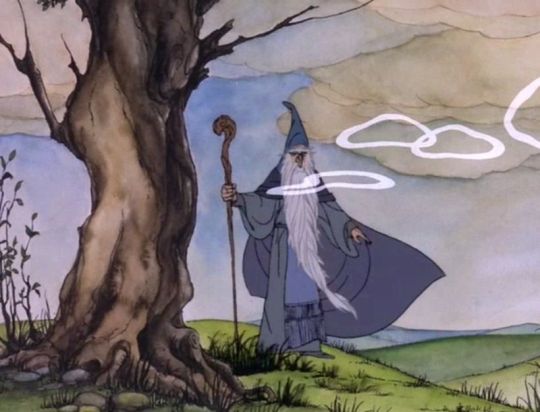

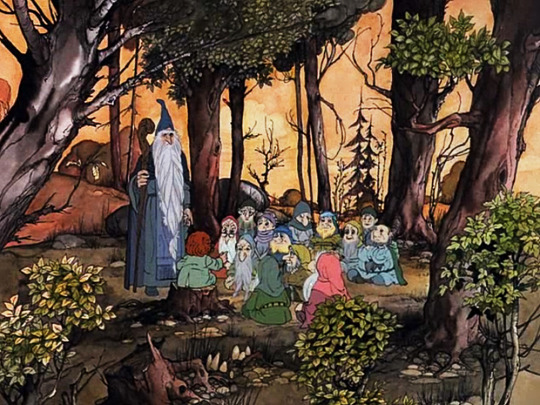
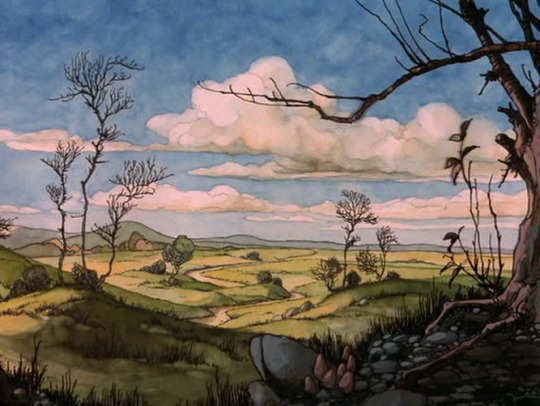

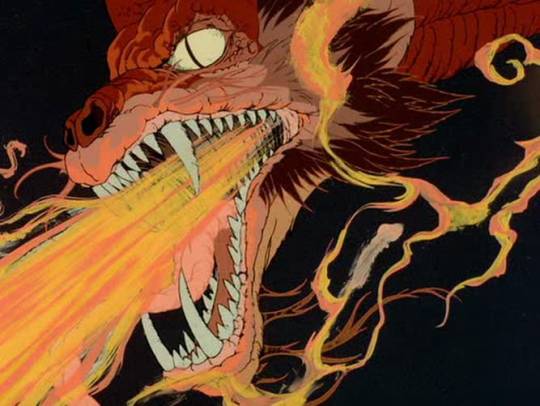
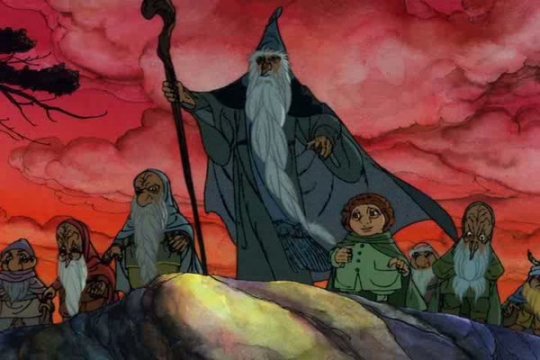

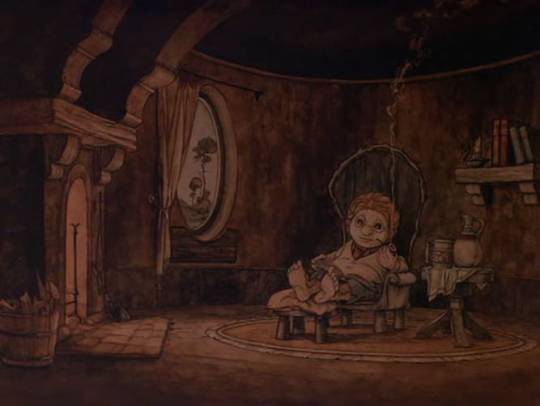
Despite its flaws, there has never been a more beautiful and faithful adaptation of Tolkien's work
#the hobbit#lotr#the hobbit 1977#rankin-bass#the sheer fact that they incorporated THE SONGS#the joy and relief of arriving at rivendell to a chorus of elfsong is unparalelled#and bearded elrond with a crown of stars is GOAT#i love the idea of him retaining a beard as half elven#....though in all honesty i think having become spiritually full elf his physiology wouldve followed suit#as the elven form is defined by a half spiritual body... his physiology would've had to have changed alongside his spirit#aragorn retained a strong spiritual form as well due to his elven blood... but as man did not have the full simulatenous conscious presence#and tolkien’s theology certainly wasnt dualist despite depiction of tangible spirituality... it was more ’multidimensional’ than individual#so i think elrond's material form must've aligned to elven biology as well to posess such a spiritual nature... meaning no beard :(#but we can dream cant we#at least we got the shipwright and the ancient un-fallen elves in the West probably have beards too#they'll give elrond one when he gets there
285 notes
·
View notes
Text
Christian Denominations as Tolkien Races
Catholics are elves, because they're the most prominent of the historic denominations.
Orthodox are dwarves, because we're the other historic denomination, but we're the less prominent of the two, but mostly because of shared beard power.
Classical Protestants (Anglicans, Lutherans, Reformed) are the Men of Gondor; younger than the historic denominations/elder races but still ancient, and both now much faded from the past.
Neoclassical Protestants (Methodists, Baptists, Congregationalists) are the Men of Rohan; younger and less grand than even the classical Protestants/Men of Gondor, but still with age and glory.
Modern Protestants (Pentecostals, non-denominationals) are the Hobbits; seen as a joke by most others and usually not very knowledgeable about the other, older denominations/races
22 notes
·
View notes
Text
tolkien meta: the melodic structure of the ainulindale, arda's endgame, and the doom of men
so basically this is about what one can learn and connect to the rest of the legendarium's lore from the ainulindale, and also peer into tolkien's psyche as a side effect i guess. expect excessive theology or more fun imo philosophy of divinity and lengthy tangents about melkor, the nature of evil and theodicy
a small disclaimer - this touches thorny topics in philosophy like the problem of evil, the nature of redemption/salvation, death...
this isn't about my beliefs but presenting and reflecting on tolkien's own within the history of ideas. i acknowledge anyone who reads this also has their own, and can agree or disagree with tolkien. my views may seep in unintentionally but i try to go deeper than that.
pd: I write Eru/One/God indistinctively on purpose. it's for rhetorical emphasis, not so much out of (default cultural) christianity.
part I - introduction (in this post) part II - the themes/structure, discussion part III - discussion (cont): themes of arda and life part IV - discussion (cont 2): theme of the children part V - discussion (cont 3): aftermath/second music
Introduction (i rec reading even if you're versed in the lore)
for those who are not so familiar with parts of the legendarium but still interested in a deep dive, the ainulindalë ("song of the ainur") is the creation myth of tolkien's world.
i rec just reading it if you haven't even if it's after reading this. it's quite beautiful and unique and it's brought admiration even from ppl who study that kind of thing professionally about real cultures. i'm not given to flattery but idk just check it out.
so anyway, the ainur, spirits born from the One creator's mind directly, sang under (or despite) His direction and the melody (both harmony and discord) that resulted, is the history of the world.
by the world we have two concepts here, the entire universe (eä) and the planet (arda) 'earth', of which middle-earth is a later-stage continent. the music itself was a creative process that the ainur partook in before knowing the full implication of their singing.
God showed the ainur the vision of what their music had created and when they saw the world they wanted to live it, to dwell on it and experience it.
God granted this but said they had to remain in it until the full music, the full story had played out.
this includes everything that happens in the Silmarillion, the LOTR movies and sequels/prequels, the TROP series, games, etc, and in some stages of Tolkien's opus, our own world (WWI, WWII, etc).
the Discord refers to the rebellious effect of Melkor on the music as much as his part of the music - the dissonance born from his part's coexistence with the rest of the melody that is in harmony, and takes a 'life of its own'.
this is not unimportant, but i'm not going to discuss it at any point. i will point out here that it has been argued -controversially- by some people to be relevant in compatibilizing or explaining otherwise difficult-to-reconcile lore points that deal with "non-Melkorian evil". this is about things like Ungoliant or the nameless things 'whose mention darken the light of day', whose in-world origins are unclear.
on a broader note, this represents two very different intuitions about evil and divinity (Tolkienian v Lovecraftian, we could say). these are difficult to compatibilize and more than Tolkien's psyche, represent ancient tensions within monotheistic religions themselves, i think. so within Tolkien's world, which has an Abrahamic/monotheistic god, you still find traces of Lovecraftian horror.
all that follows is about Tolkienian evil (meta) i.e. Melkorian evil (in-world), that is uncontroversially and explicitly under the governance of the One, although non-Melkorian evil is a fascinating subject.
#trop#rop#rings of power#the rings of power#lord of the rings#the lord of the rings#silmarillion#lotr#tolkien#ainulindale#music of the ainur#song of the ainur#ainur#ainu#melkor#manwe#apokatastasis#problem of evil#theodicy#christian theology#catholic theology#theology#eschatology#soteriology#redemption#salvation#christianity
31 notes
·
View notes
Text
Have patience, do what is necessary, and hope.
-Tolkien
7 notes
·
View notes
Text
Melkor can't sing to save his own life, but Mairon can.
Melkor is the extreme evil, whilst Eru is the extreme good.
In the middle of extreme black and white, is always a gray.
That is Mairon-Sauron.
What type of creation is it if there is not a balancing agent present, the incarnation of the whole aspect of experience and being?
#Sauron#Mairon#Melkor#Morgoth#Eru#Eru Iluvatar#LOTR#Lord of the Rings#The Lord of the Rings#TROP#The Rings of Power#Rings of Power#JRR Tolkien#Tolkien#theology#discussion#discussions
17 notes
·
View notes
Note
Hey- do you have a link to that CS Lewis piece in Mythopoeia?
Thamk
I was remembering; the name of the journal is Mythlore, not Mythopoeia; it's also earlier than I thought (I must have read it about a decade late); but here it is!
6 notes
·
View notes
Text
I realized something about the Silmarils again and now I am sad again.
So, Gil-Estel, Star of (high) Hope. The one that wasn't reclaimed/stolen* and lost by the Feanorians.
And there are three of them. You know what else comes in a set of three and contains Hope? Faith, Hope, and Love, the... Whatever it's called in English. Anyway we could have three stars, for three beautiful things.
Even more sad: the one that got away was Elwing's. She originally had two brothers. We could have a star per each of them. Somehow. (Yes, someone would have to steal them, but let's ignore this so I can blame everything on Celegorm, because I don't like the guy)
*your opinion may vary
Ok, this post seems not very interesting so let's add a poll
#Silm#but more random than usual#it's not very thought out#ok the others aren't either#silmarillion#tolkien#silm#tolkien legendarium#the silm#the silmarillion#the silmarils#silmarils#earendil#gil-estel#silm polls#my polls#polls#theology?#but like basic level
19 notes
·
View notes
Text

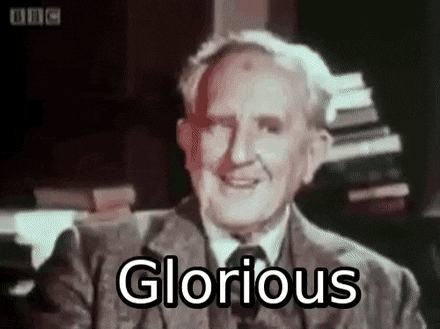
There was a quotation from Simone de Beauvoir that I read in the paper only the other day… You may agree with those words or not, but those are the key spring of The Lord of the Rings.
J. R. R. Tolkien, 1968
Tolkien is talking about Original Sin in which death ("the wages of sin is death" as Paul would put it in the gospels) was never part of the original design of God before the Fall. De Beauvoir unwittingly makes the point for Tolkien. Had she known she might have choked on her coffee in Café de Flore.
#tolkien#jrr tolkien#quote#simone de beauvoir#de beauvoir#inspiration#death#books#lord of the rings#literature#original sin#catholicism#christology#theology#french existentialist
52 notes
·
View notes
Text

#lord of the rings#lotr#lotr imagine#lotr quotes#tolkein#j r r tolkien#tolkien quotes#tolkien#jrr tolkien#traditional catholic#christian blog#mine#catholicism#catholic#catholic theology
64 notes
·
View notes
Text
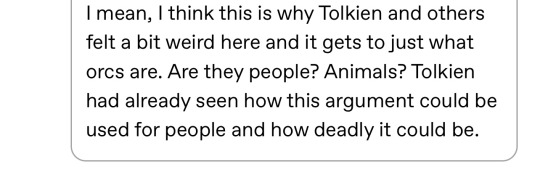
By Catholic standards, if Orcs are animals, they lack a soul to even be corrupted. Hence Sauron had to house evil dead souls within his werewolves. Since Tolkien never formally settled on Orc origins, I’m basing my post on the commonly held interpretation of Orcs-as-corrupted Elves.
My argument: Orcs cannot be redeemed through social engineering even in infancy. Hence why Tolkien described the Orcs as evil yet not irredeemable; and struggled with how to fit them into his legendarium moral cosmology.
It’s not about whether Orcs can be redeemed or not — it is a matter of how
Set aside secular notions of evil, good, corruption, and redemption — these are theologically defined. Simply, Illuvatar is perfect good. Misdeeds are moral evils. Misdeeds lead to evil. Evil is a state of being. Evil is not opposite of good but degrees absent of goodness. An evil person can have some good, but a good person cannot have some evil.
To believe Orcs can be “redeemed” through social engineering fundamentally misunderstands the moral cosmology, as it reduces corruption to a cultural and psychological phenomenon. Redemption is mistakenly framed as achievable without Iluvatar’s mercy and grace (although Morgoth and Sauron lies, and Orc culture, certainly didn’t help).
So, a rescued Orc baby won’t be good but perhaps less evil — if their “creaturely” needs are met; and one appeals to their fear and self-interest.
When Morgoth corrupted Elves with his evil, he damaged their fea — that is, their very capacity to choose good
Because Orcs possess far weaker wills than those of Elves and Men, it’s much harder to resist evil temptations. Here lies the issue: redemption is about the will. So, Orcs must rely on Illuvatar’s intervention:
Morgoth and Sauron must repent
Orcs needs an Orc Jesus. Illuvatar reincarnating as an Orc Jesus — The Redeemer
Orcs are above all a symbolic literary device to convey grander messages. They represent the greatest abuse of freedom; and desecration of beauty and sanctity. Orcs are horrid but pitiful testaments Morgoth and Sauron’s evil. Tolkien is well aware that the corruption of Orcs is f—up. That is the point.
38 notes
·
View notes
Video
youtube
The Problem with Ents | LOTR Monsters Pt. 2
I slowly understand why there is Tolkien scholarship at all. It always seemed kind of weird to me that there are fields of academia that focus on one author alone. An author, at the end of the day, is just some person making shit up. And as interesting as if may be, can it ever be interesting enough to justify a bunch of scholars dedicating their career to figuring them out?
Well, seems like it.
I’ve never seen a university from the inside, I wouldn’t know.
#youtube#breadtube#lord of the rings#jrr tolkien#middle earth#ents#entwives#catholic theology#paganism#franciscan theology#media studies#movie analysis#book analysis
4 notes
·
View notes
Text
Book Reviews From 2023
Looking for something good to read? Here are the books I read and reviewed in 2023.
I love reading, and I love sharing my love of good books with others! Here is a list of the books I read and reviewed in 2023. Click on a title to be taken to that review. A Hobbit, A Wardrobe, And A Great War Opportunity Leadership Proverbs: Amplified and Applied Sage Advice Here are my book reviews for 2011. Here are my book reviews for 2012. Here are my book reviews for 2013. Here are my book…

View On WordPress
#autobiography#Bible study#biography#book review#C.S. Lewis#Christianity#Dick Brogden#fiction#Greg Heeres#history#J.R.R. Tolkien#leadership#memoir#proverbs#theology
2 notes
·
View notes
Note
Yes but also. Religion is not the same as mythology. Religion also includes religious praxis, traditions, philosophy etc. But Religions (and yes, also Christianity) do very much contain Myths and Mythology as a narrative form of conveying religious experiences and worldviews. And I don't mean that derogatorily. A lot, if not most sincere christian theologians pretty much agree that many parts of the Bible need to be understood as mythological and it was in fact intended that way.
So no, God as such is not mythology. But a lot of the stories that tell about experiences with God/existential religious questions eg. the bible or other religious scripts use the genre of mythology to convey their messages. That doesn't make them less true in a religious sense, it just means they were never meant to be read as scientific facts but as human stories about existential/religious experiences. So yea, I'd agree, you can tag Bible stuff with #mythology and still believe the Bible to hold religious truth (I do), it's not a contradiction. Just be aware then that other mythology might also hold religious truth then as well, whether you personally believe in it or not.
Interestingly enough J.R.R. Tolkien did a lot of (really interesting) work on that, I highly recommend reading his essay "On fairy stories"!
dont tag bible stuff as mythology God isnt mythology
hi hello how are you. most if not all story-based religions are in fact considered mythology by definition including the abrahamic religions. god is in fact abrahamic mythos whether you think he’s real or not. im sorry if that upsets you but im assuming this is regarding the post i just reblogged and i have to say im surprised the part you’re upset about is me tagging biblicalia as mythology and not the entire discussion on who tops in jesus/judas ship discourse
22K notes
·
View notes
Text
What I Read in 2024
Every year, I commit to reading as much and as widely as possible. And as a means of attempting to remember everything I’ve read and holding myself accountable to my reading goals, I track the books I’ve read each year. (Click here to see what I read in 2023.) A couple of notes on this list. First, this is not a “what you should read” list like some of the others that you might see floating…
#2024 Reading List#Biography#Book#Book Lists#Books#History#Literature#Read#Reading#Reading List#Theology#Tolkien
0 notes
Text
youtube
0 notes